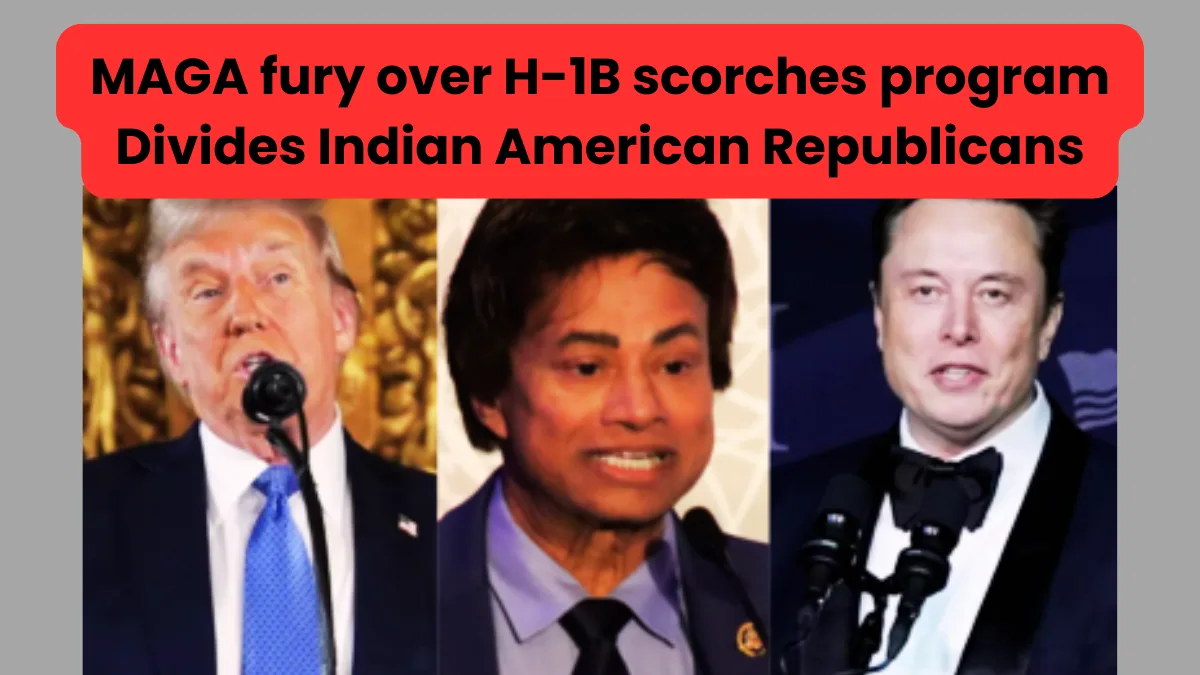In recent weeks a heated immigration debate has erupted in the US with Indian American lawmakers and professionals at the centre of the storm. Indian American Congressman Shri Thaedar feasted on online abuse after advocating for increased H-1B visa and streamlined process from skilled workers were met with Xenophobic backlash, particularly from hardline MAGA (Marke America Great Again ) supporters. This article covers all the information regarded to MAGA fury over H-1B scorches even Indian American Republicans.
What is the H-1B visa ?
The H-1B visa is a non immigrant visa that allows us companies to employ foreign workers in speciality occupations that require technical expertise. These companies depend on H-1B visas to hire employees each year from countries like India and China . The company demands for more H-1B visas to attract high skilled workers to the USA .
The H-1B visa program is vital for the U.S. economy, helping companies like Google, Tesla, and Microsoft access skilled global talent. These immigrants contribute to technological advancements and job creation. However, the debate is often clouded by cultural biases, with some critics targeting Indian professionals and questioning their compatibility. This reflects prejudice rather than fact.
Figures like Vivek Ramaswamy argue that the real issue is declining academic rigor in the U.S., stating, “A culture that celebrates mediocrity cannot compete globally.” The solution lies in improving education while recognizing the value H-1B workers bring to the economy.
How did the debate begin
Controversy erupted earlier this week after an Indian American Congressman who expressed support for the H-1B visa program and greater legal immigration to the USA was trolled and asked to “go back to India” by MAGA .
One comment “ can I buy you a ticket to Mumbai ?” One way of course ,read one online comment directed at Thanedar other accused for more immigrants , with one troll writing “you need to be denaturalized and deported” this comments reflects a growing intolerance towards not only foreign workers but also US-born Americans of Indian origin and legal immigrants facing the brunt of extreme nativist fury.
As an immigrant myself, the H-1B issue is close to my heart,” Thanedar wrote. “Attracting legal, talented immigrants to the United States benefits everyone, and the system must be streamlined and reformed.”

Thanedar’s remarks came in response to growing concerns from businesses and tech leaders about a shortage of skilled workers in STEM fields. Companies like Google, Microsoft, and Tesla have long advocated for an expansion of the H-1B program to meet the demands of a rapidly evolving global economy.
The controversy underscores the polarized nature of immigration discussions in the U.S., where pragmatic policy proposals often clash with nativist sentiments. For Thanedar, what began as a call for balanced reforms to support American businesses has evolved into a larger conversation about racism, xenophobia, and the role of skilled immigrants in shaping the future of the American economy.
Rising Xenophobia in MAGA Circles
MAGA supporters have increasingly targeted Indian immigrants, fueling xenophobic narratives around the H-1B program. Critics allege that Indian professionals are replacing American workers, a claim unsupported by data. This hostility reflects a broader nativist sentiment, as evidenced by comments like, “You need to be denaturalized and deported.”
Indian American Republicans have also faced backlash. Conservative commentator Ann Coulter’s remark to Vivek Ramaswamy—“I would not vote for you because you’re an Indian”—exemplifies the racial biases within parts of the MAGA movement.
Conclusion
The backlash against Shri Thanedar reveals deep divisions in America’s immigration debate between Indian American Republicans. While the H-1B visa program addresses critical skill shortages, it has become a flashpoint for nativist rhetoric. Leaders like Thanedar continue to champion balanced immigration reforms despite the growing hostility.
As xenophobia rises, it is crucial to focus on facts: skilled immigrants drive innovation, fill talent gaps, and strengthen the U.S. economy. A nuanced approach to immigration policy is essential for maintaining America’s global edge in an increasingly competitive world.
